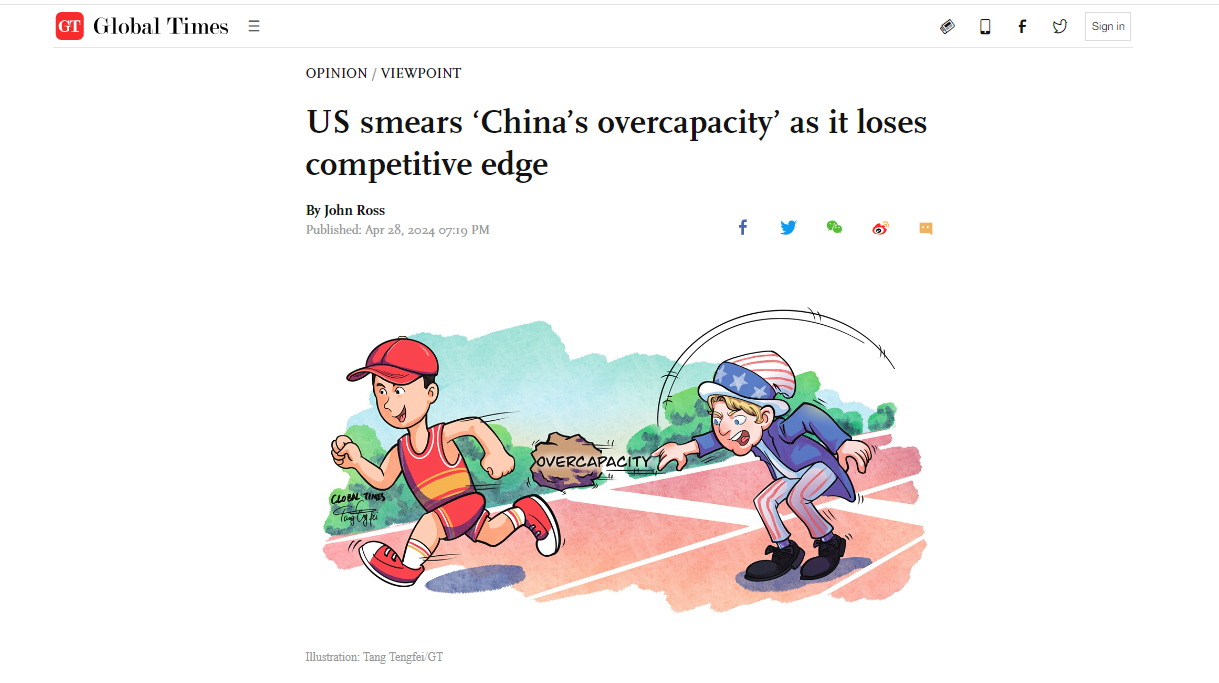LATEST INSIGHTS
Your Present Location: LATEST INSIGHTSJohn Ross: US smears ‘China’s overcapacity’ as it loses competitive edge
Source: Global Times Published: 2024-04-21

The US campaign claiming that China has economic 'overcapacity,' particularly in green technologies, is absurd - the US never applies it to its own industries and it violates everything known in economics.
The US is a large exporter of civil aircraft, agricultural products, high technology goods, armaments and other industries. US production of these greatly exceeds domestic use. But the US does not declare it is suffering from 'overcapacity,' nor does it insist US farmers plant less crops, Boeing build less aircraft, US banks be downsized - because in 2023 US financial institutions ran a $113 billion trade surplus, or US R&D must be cut for creating an international surplus of $82 billion on intellectual property receipts.
The US has a comparative efficiency advantage in these industries it exports, and in return imports products that other countries produce more efficiently - resulting in an overall US 2023 balance of payments deficit of 3.0 percent of GDP.
Equally China, in industries where it is strong, such as green products, has become a large exporter of solar panels, batteries, wind turbines and EV vehicles, among others. China, in return, is a large importer in sectors where other countries have advantages. In terms of services, China has a weaker competitive position compared to the US - in 2023 the US' service trade surplus was over $280 billion while China had a deficit of $171 billion.
The US argues that China should cut back its successful industries when the US is not doing so in its own. Clearly, US talk of 'overcapacity' is not objective economic policy, but merely a badly disguised attempt to weaken China in areas where the US is not competing successfully.
Consider the issue more fundamentally. Adam Smith created modern economics 250 years ago, in The Wealth of Nations, precisely by analyzing such issues. Smith pointed out that a country becomes less efficient by aiming at self-sufficiency, via protectionism-because no country is the most efficient at producing everything. Therefore, countries gain in development and prosperity from an international division on labor in which they produce products where they are most efficient and import from other countries products where they have greater efficiency. This international division of labor creates the basis of international trade.
It precisely flows from this that a country's trade will not be balanced in each sector. It will run surpluses in industries where it has relative efficiencies and deficits in those where other countries are more efficient-precisely, the US and China.
The reasonable demand by international organizations is that a country's overall trade should be relatively balanced-not running excessive overall balance of payments surpluses or deficits. This is clearly China's case. In 2023, China's balance of payments surplus was 1.5 percent of GDP, within a reasonable range by international criteria.
What the US is concerned about is being outcompeted in key new industries-particularly green ones which China has promoted. But the US is being outcompeted because it decides to spend resources on other things.
US military spending in 2023 was 3.6 percent of GDP compared to 2 percent it urges for other NATO members. US health spending in 2019, even before the increase under COVID-19, was 16.7 percent of GDP compared to Germany's 11.7 percent. But US health spending is stupendously inefficient - US life expectancy was 78.8 years, compared to Germany's 81.3.
Reducing US military spending even to average levels, or adopting the public-centred health systems of other countries, would release hundreds of billions of dollars to increase US investment in new green industries, overcoming its competitive lag - the US loses in green industries competition simply because it chooses to spend its resources elsewhere.
When the US says, 'We chose to spend money on weapons instead of green products, as a result, we are uncompetitive, so you must cut your spending on green products,' the rest of the world can and should reply simply, 'No, that would damage us.'
In green industries the world faces not 'oversupply' but the danger of undersupply. The International Energy Agency warns that current use of fossil fuels instead of green energy is 'excessive' if disastrous climate change is to be avoided. China is the world's most efficient green technology producer. However, even China cannot meet all the world's needs. It would be a step forward if the US diverted resources from present uses to increase its efficiency and output of green products.
The US argument on 'overcapacity' should therefore be rejected as a self-seeking claim it does not apply to itself, because it is against fundamental principles of economic knowledge, and is against the interests of the world.
The author is senior fellow at Chongyang Institute for Financial Studies, Renmin University of China. opinion@globaltimes.com.cn
Key Words: John Ross, China, US, Overcapacity























































































 京公网安备 11010802037854号
京公网安备 11010802037854号





